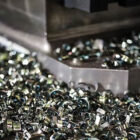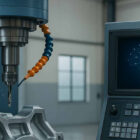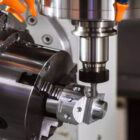As the field of precision manufacturing evolves, boring bars – essential tools for enlarging and finishing holes with high precision – are undergoing remarkable changes. Driven by advancements in automation, artificial intelligence (AI), and material innovation, contemporary boring bars are evolving to be more intelligent, efficient, and versatile for intricate machining operations. These advancements are enhancing productivity while also fostering improved consistency and quality in high-precision sectors. In this blog, we delve into the emerging trends that are reshaping the future of boring bars in precision machining, providing insights into how these innovations are revolutionizing performance and reliability in manufacturing.
Artificial Intelligence and smart machining
AI is progressively being incorporated into machining processes, introducing a new dimension of intelligence to boring tasks. By examining data from sensors integrated into boring bars, AI algorithms can forecast tool wear, enhance cutting speeds, and identify anomalies in real-time. This predictive maintenance strategy minimizes unexpected breakdowns and boosts overall equipment efficiency. Moreover, AI-powered systems can draw insights from historical data to refine machining strategies, resulting in ongoing process optimization. As AI technology evolves, we can anticipate even greater autonomy and decision-making capabilities in boring operations.
Automation and CNC integration
The advent of CNC systems has revolutionized machining processes, enabling greater precision and repeatability. Today’s boring bars are designed to integrate seamlessly with CNC machines, facilitating automated adjustments and real-time monitoring. This partnership enhances productivity and reduces human error, ensuring consistent quality in mass production. Moreover, automation allows for the adoption of advanced boring techniques, such as adaptive control systems that adjust cutting parameters in real-time based on sensor feedback. This proactive approach ensures optimal cutting conditions, extends tool life, and minimizes downtime.
Industry 4.0 and digital connectivity
The emergence of Industry 4.0 has ushered in a new age of digital connectivity within manufacturing. Boring bars that are outfitted with sensors and IoT capabilities can interact with other machines and systems, allowing for real-time data sharing and process synchronization. This level of interconnectedness promotes smarter decision-making, predictive analytics, and seamless integration into the larger manufacturing ecosystem. As digital technologies progress, we can expect even higher degrees of automation and intelligence in boring operations, resulting in improved productivity and competitiveness.
Advanced materials and coatings
The increasing demand for machining tougher and more intricate materials has spurred the creation of advanced materials and coatings for boring bars. Carbide and ceramic composites provide exceptional hardness and heat resistance, making them ideal for high-speed machining applications. Furthermore, coatings like titanium nitride (TiN) and diamond-like carbon (DLC) lower friction and wear, thereby prolonging tool life. These advancements in materials not only enhance performance but also promote sustainability by decreasing the need for frequent tool replacements and reducing waste.
FineTech Toolings, based in Bangalore, is distinguished by its proficiency in producing boring bars tools with cutting-edge materials and precision engineering techniques. Their offerings utilize high-quality carbides and innovative composites that are engineered to endure extreme machining environments, ensuring exceptional rigidity and durability. FineTech Toolings’ dedication to quality guarantees that their boring bars provide outstanding wear resistance and reliable performance, even when dealing with difficult alloys. By merging advanced materials with careful craftsmanship, FineTech Toolings helps manufacturers in enhancing productivity and sustainability in their precision machining operations.
Miniaturization and micro-machining tools
With the advancement of microelectronics, medical devices, and aerospace mini-components, there is an increasing demand for ultra-precise, miniature boring bars. These tools are required to uphold tight tolerances and exceptional rigidity, even at microscopic dimensions. Recent innovations in materials and manufacturing processes are facilitating the creation of boring bars with diameters as small as 0.5 mm, which still provide high performance. Future developments indicate a trend towards further miniaturization, featuring improved strength-to-weight ratios and sensor integration within micro-tools. This evolution will enable manufacturers to create more compact and intricate components without sacrificing precision or durability.
Customization and modular designs
To cater to the varied needs of different industries, manufacturers are providing customizable and modular boring bar solutions. Modular designs facilitate swift tool changes and adaptability to various machining tasks, improving flexibility and cutting down setup times. Customization guarantees that the tool geometry and specifications are precisely aligned with the application, enhancing efficiency and accuracy. This move towards tailored solutions is especially advantageous in sectors such as aerospace and medical device manufacturing, where precision and reliability are critical.
Environmental considerations and sustainability
Sustainable manufacturing practices are becoming increasingly important, and boring bar technology is advancing to meet these objectives. Innovations like minimum quantity lubrication (MQL) systems help minimize coolant usage, while energy-efficient machining techniques reduce power consumption. Furthermore, utilizing recyclable materials in tool manufacturing aids in environmental preservation. By adopting sustainable practices, manufacturers not only lessen their environmental impact but also realize cost savings through enhanced resource efficiency.
Integration of additive manufacturing and hybrid machining
The merging of additive manufacturing with subtractive machining is giving rise to hybrid machining systems that can construct and refine components within a single setup. Boring bars are essential in these hybrid settings, as they finish internal geometries right after the metal is 3D-printed. This integration removes the necessity for relocating parts, which minimizes errors and enhances dimensional precision. In the future, boring bars may be specifically designed with coatings and geometries tailored for post-additive machining, enabling them to work with layered materials and intricate internal features. Such tools will optimize workflows and pave the way for customized, high-precision manufacturing solutions.
Digital twins and predictive maintenance
The advent of digital twin technology is revolutionizing the monitoring and maintenance of tools such as boring bars. By developing a real-time virtual representation of a boring bar, manufacturers can accurately track wear, performance, and environmental stress. This facilitates predictive maintenance, helping to prevent unexpected failures and enhance tool longevity. When combined with AI and machine learning, digital twins can predict performance trends, suggest settings, and even initiate automated tool changes. This not only increases efficiency but also significantly reduces downtime and waste. As smart manufacturing progresses, digital twins will be crucial for maximizing the reliability and effectiveness of boring bars.
The future of boring bars in precision machining is being influenced by significant advancements in automation, artificial intelligence, materials engineering, and smart customization. These developments are turning boring bars into intelligent, flexible, and environmentally friendly tools that meet the needs of contemporary manufacturing. From enhancing productivity and precision to promoting sustainable practices, the progression of boring bar technology mirrors a larger movement towards innovation and efficiency. As precision machining becomes increasingly intricate and competitive, adopting these next-generation boring bar solutions will be essential for manufacturers looking to maintain an edge in quality, speed, and environmental stewardship.




